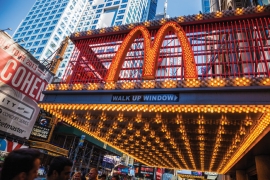Archived article
Please note that tax, investment, pension and ISA rules can change and the information and any views contained in this article may now be inaccurate.

By pure coincidence, the last three films I’ve seen have involved the stock market and the world of business. I can recommend all of them if you are looking for entertainment value and valuable lessons about investing.
Although billed as an action thriller, the plot of The Accountant includes tricks used by companies when preparing to list their shares on a stock market. The film’s gun-wielding hero was able to spot missing money in a corporation by factoring in typical labour costs, commodity prices and other factors to see how profit figures weren’t correct.
Without wanting to give any spoilers, the investing lesson was about taking cash out and putting it back in to a business to inflate its sales, and thus command a higher stock market valuation.
I flagged mining-based film Gold in this column in January as its story was based on a fraud that prompted greater protection measures for investors. I’ve now seen it. The film makers did a good job and showed how the general public can be easily duped into investing if a salesman spins a convincing story.
A tasty tale
The one film that really got me thinking for a long time afterwards was The Founder. This explored the origins of the McDonald’s restaurant empire.
It told the story of how a chap called Ray Kroc ran the original founders of McDonald’s into the ground through dirty tricks as the person in charge of franchising.
My key takeaway, to excuse the pun, from The Founder was how McDonald’s is more than just a burger flipper.
Kroc is down on his luck during the film after realising that his franchise system isn’t working in his favour. A 1.4% royalty on a 15c hamburger wasn’t enough to cover his salary and provide money to fund field inspectors to ensure quality standards were maintained.
He was advised to set up a real estate business, owning land for future restaurants and insisting new franchisees had to lease this land for their business. That would provide higher returns and give an element of control as the lease could be cancelled if the franchisee didn’t maintain quality standards.
Why McDonald's is appealing
Many franchise owners profit from their franchisees by selling them supplies or demanding large royalties. McDonald’s earns a rental income and takes a cut of sales. It does have some corporate-owned stores but the latest strategy is to concentrate on growth via franchising.
McDonald’s is in a great position, if you think about it. It has two income streams and one of the most resilient businesses in the world.
You may argue there is intense competition for fast food, but that’s been the case for a very long time. For all the changing consumer tastes, pressure on eating healthier food, etc, I still see queues of customers every time I pass a McDonald’s outlet. The company has a clear plan to increase return on invested capital and boost operating margins.
It is a survivor, underpinned by a property asset-backed balance sheet and steady cash inflow. I personally don’t like to eat there, but I’m certainly interested in feasting on its shares.

This article is provided by Shares Magazine. Shares publishes information and ideas which are of interest to investors. It does not provide advice in relation to investments or any other financial matters and does not guarantee the accuracy or completeness of the information in this article.
Investors acting on the information in this article do so at their own risk and AJ Bell Media Limited and its staff do not accept liability for losses suffered by investors as a result of their investment decisions. Shares is published by AJ Bell Media Limited part of AJ Bell.
